Backyard
Can You Put Dry Wood Through a Wood Chipper? (Explained)
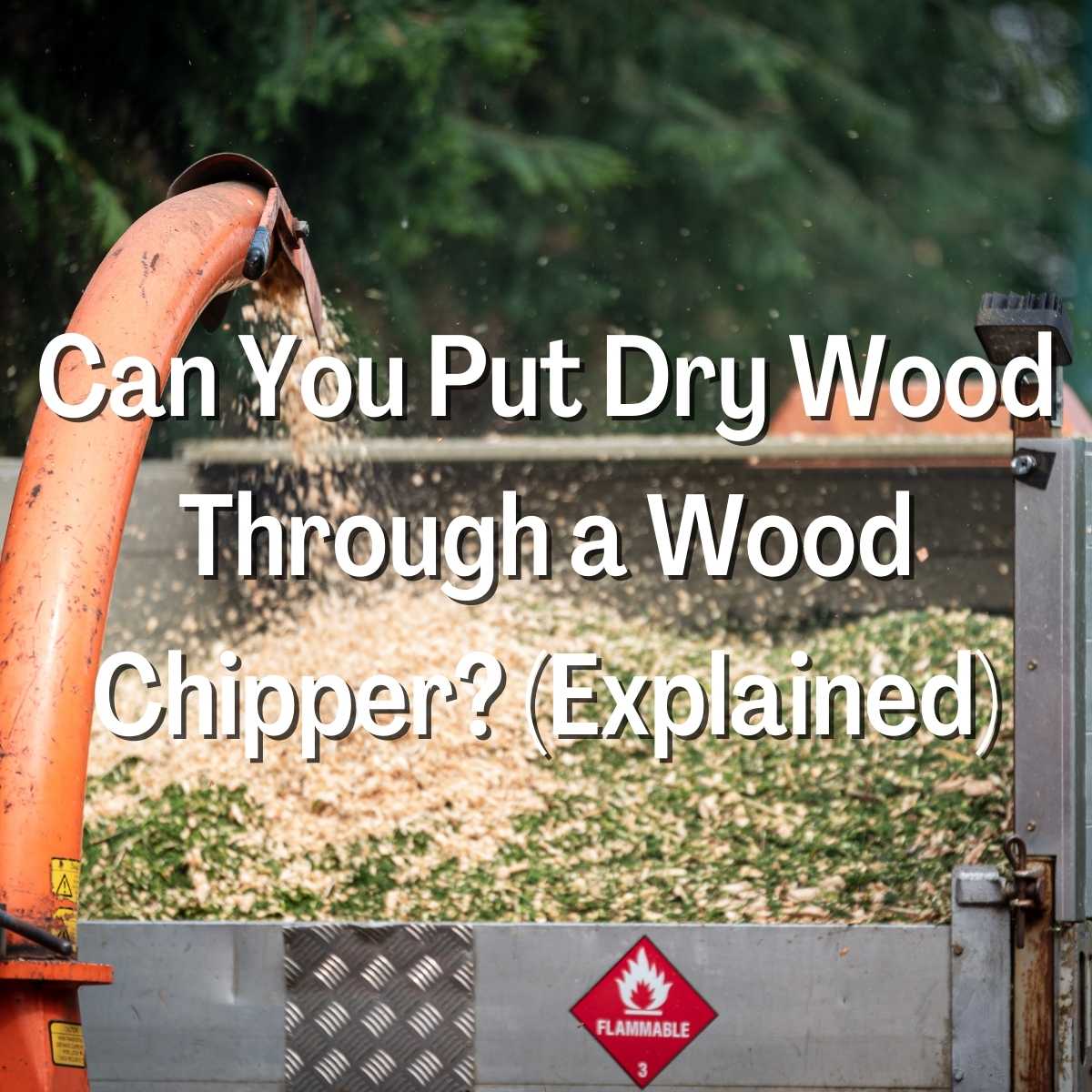
Can you put dry wood through a wood chipper? The answer is yes, and there are several benefits to doing so.
By putting dry wood through a wood chipper, you can make mulch, which can be used for gardening and landscaping purposes.
Additionally, mulch helps retain moisture in the soil, which benefits plants.
What Is a Wood Chipper, and What Are Its Benefits?
A wood chipper is a powerful machine that can quickly turn large pieces of wood into smaller pieces, such as chips or mulch.
There are several benefits to using a wood chipper:
- You can make mulch: Mulch is a great way to add nutrients to your soil and help your plants retain moisture. It also helps keep weeds at bay.
- You can clear your property of brush and debris: A wood chipper can quickly clear your property of brush, fallen branches, and other debris. This can be helpful if you’re preparing your property for a new landscaping project.
- It’s eco-friendly: Wood chippers are a great way to recycle wood that would otherwise end up in a landfill.
Related Post: Using Potting Soil to Plant a Tree (Tree Planting Tips)
If you’re considering using a wood chipper, be sure to read the safety instructions carefully and always wear proper safety gear, such as gloves, goggles, and ear protection.
How Do You Put Dry Wood Through a Wood Chipper Safely and Effectively?
Now that you know the answer to “can you put dry wood through a wood chipper,” it’s time to learn how to do it safely and effectively.
Here are a few tips:
Start with small pieces of dry wood: When first using your wood chipper, start with small pieces of dry wood. This will help you get a feel for how the machine works and how much pressure you need to apply.
Work your way up to larger pieces of wood: Once you’re comfortable with smaller pieces of dry wood, you can start feeding larger pieces into the machine.
Be sure to wear proper safety gear: As we mentioned before, always be sure to wear proper safety gear, such as gloves, goggles, and ear protection, when using a wood chipper.
Following these tips, you’ll be able to put dry wood through your wood chipper safely and effectively.
What Are Some of The Things You Can Make with Mulch from A Wood Chipper?
As we mentioned before, one of the benefits of using a wood chipper is that you can make mulch.
Mulch is a great way to add nutrients to your soil and help your plants retain moisture. It also helps keep weeds at bay.
You can use mulch in your gardening and landscaping projects in many different ways. Here are a few ideas:
Related Post: Should You Remove Pine Needles from Under a Tree? (Answered)
Top your flower beds with mulch
A layer of mulch will help protect your flowers from the elements and keep them healthy.
Use mulch as weed control
Mulch can help prevent weeds from taking over your garden by blocking out sunlight and smothering weed seeds.
Make a path with mulch
Add a layer of mulch to create a natural-looking path through your garden.
As you can see, there are many uses for mulch!
Are There Any Drawbacks to Using a Wood Chipper to Create Mulch?
One potential drawback to using a wood chipper to create mulch is that the process can be time-consuming.
Gathering enough wood to fill the chipper can take some time, and then you need to wait for the chipper to do its job.
Another potential drawback is that you need to have a place to store the mulch until you’re ready to use it.
This can be challenging if you don’t have a lot of storage space.
Additionally, woodchippers are expensive! If you’re not planning to use it often, you may want to consider renting one instead of buying one.
Overall, using a wood chipper to create mulch is a great way to add nutrients to your soil and help your plants retain moisture. Just be sure to factor in the time commitment and cost before you get started.
Overall, the benefits of using a wood chipper far outweigh the drawbacks!
How Should You Maintain Your Wood Chipper so It Lasts for Many Years to Come?
To get the most out of your wood chipper, it’s important to maintain it properly.
Related Post: How to Avoid Putting Down Too Much Peat Moss (Helpful Tips)
Here are a few tips:
Read the manufacturer’s instructions
Be sure to read the manufacturer’s instructions carefully to ensure you’re using and caring for your wood chipper correctly.
Clean it after each use
After each use, be sure to clean your wood chipper. This will help prevent build-up and keep the machine running smoothly.
Sharpen the blades
Periodically, you’ll need to sharpen the blades on your wood chipper. But, again, this is usually a simple process that can be done at home.
With proper care, your wood chipper can last for many years to come!
Conclusion
If you’re looking for an easy way to add nutrients to your soil and help keep weeds at bay, mulch created from a wood chipper is a great option.
Just be sure to factor in the time commitment and cost before you get started.
Additionally, it’s important to maintain your wood chipper properly so it lasts many years.
Backyard
How to Tell If Ants are a Problem in Your Raised Bed Garden (Answered)
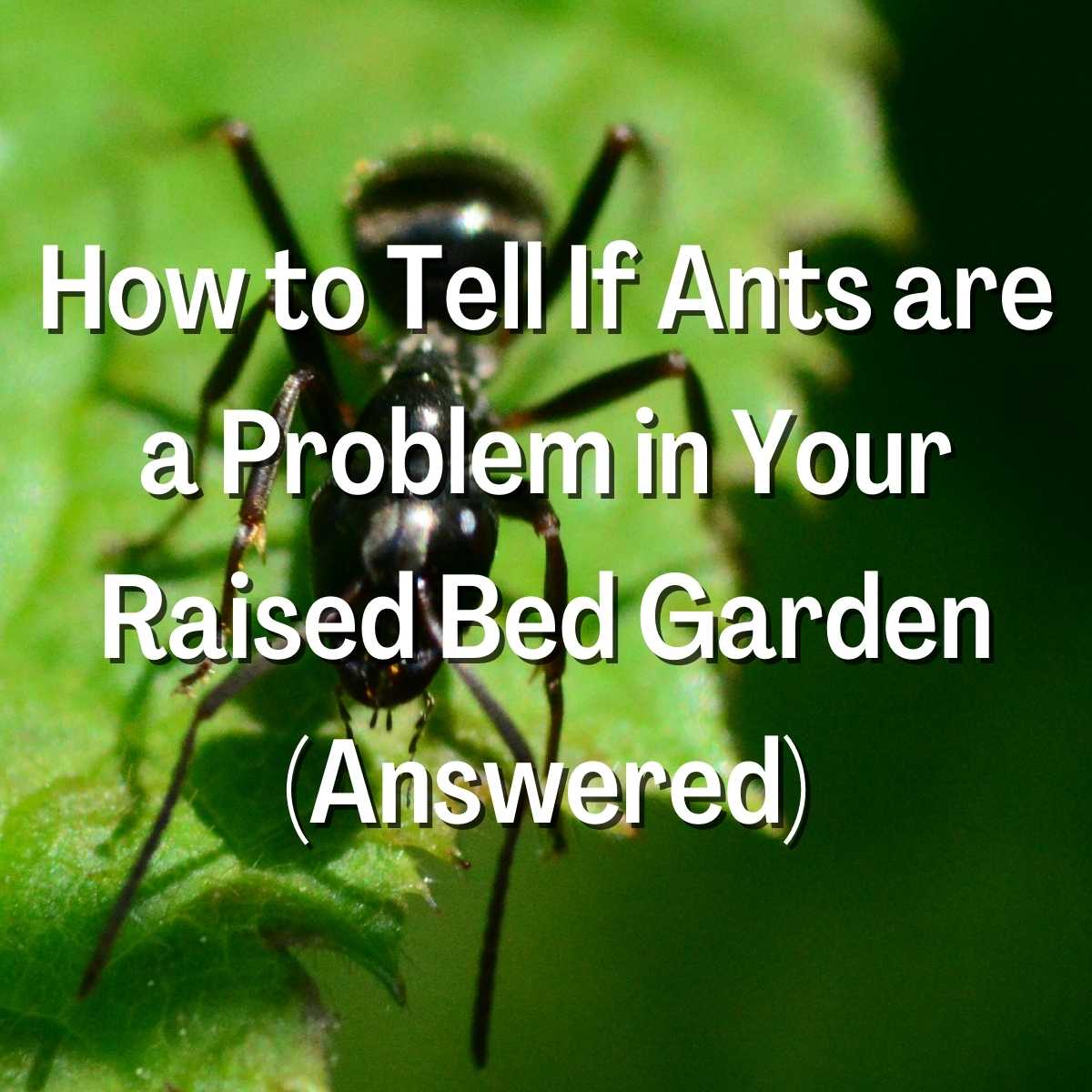
If you are a gardener, then you know that ants are a common problem in raised bed gardens. While they are not harmful to the plants, they can be a nuisance to gardeners.
This article will discuss how to get rid of ants in your raised bed garden using chemical and organic methods.
What Are Ants, and Why Are They in Raised Bed Gardens?
Ants are small, hard-bodied insects that are found in nearly every ecosystem on Earth. There are more than 12,000 species of ants, and they come in a variety of colors, including red, black, brown, and yellow. Ants are attracted to raised bed gardens because they are looking for food and water. The most common type of ant found in gardens is the pavement ant (Tetramorium caespitum).
Pavement ants are small (about 1/8 inch long), dark-colored ants that have a light-colored stripe running down their backs. These ants are native to Europe but have been introduced to North America and are now found in all 50 states. Pavement ants are attracted to sweet foods, such as honeydew (the sugary secretions of aphids), and they will also eat other insects.
Are Ants in Raised Bed Gardens a Problem?
While ants are not harmful to the plants in your garden, they can be a nuisance. These small insects can quickly become a big problem if they are not controlled.
If you have noticed ants in your raised bed garden, you can do a few things to get rid of them.
Related Post: Can You Put Dry Wood Through a Wood Chipper? (Explained)
How to Get Rid of Ants in A Raised Bed Garden
There are a variety of methods that you can use to get rid of ants in your raised bed garden, including chemical and organic methods.
Chemical Methods
One way to get rid of ants in your raised bed garden is to use a chemical insecticide. There are many different types of insecticides that are effective against ants, including baits, dusts, and sprays. When using an insecticide, be sure to follow the label instructions carefully. Some products are only for outdoor use, while others are for indoor and outdoor use.
Organic Methods
If you prefer not to use chemicals in your garden, there are a few organic methods that you can use to get rid of ants. One method is to make a homemade ant bait using sugar and borax. Borax is a naturally occurring mineral that is found in the environment. It is safe to use around children and pets when used as directed.
To make the bait, mix equal parts of sugar and borax together and put it into a container with holes punched in the lid. Place the bait near where you have seen ants and wait for them to take it back to their nest. Once the ants have taken the bait back to their nest, the borax will kill them.
Another organic method that you can use to get rid of ants is to make a spray using vinegar and water. Vinegar is an acidic substance that will kill ants on contact. To make the spray, mix one part vinegar and three parts water together in a spray bottle. Spray the mixture on the ants and their nests.
Whichever method you choose, be sure to keep an eye on your raised bed garden and remove any dead ants that you see. Doing this will help to prevent other ants from coming into your garden.
Related Post: Cleaning Your Backyard: Everything You Need to Know
Raised bed gardens are a great way to grow your own fruits, vegetables, and herbs. However, if you have ants in your garden, they can be a nuisance. By using one of the methods described above, you can get rid of ants in your raised bed garden and enjoy your garden pest-free!
Pros and Cons of Using Chemicals to Get Rid of Ants
There are a few things to consider before using any type of chemical in your garden, including:
- The chemicals can be harmful to children and pets if they are not used as directed.
- Chemicals can kill beneficial insects, such as ladybugs and bees.
- Some chemicals can be harmful to the environment.
- Chemicals may not be effective against all types of ants.
Pros and Cons of Using Organic Methods to Get Rid of Ants
Organic methods are a safe and effective way to get rid of ants in your garden. However, there are a few things to consider before using any type of organic method, including:
- Organic methods may take longer to work than chemical methods.
- You may need to use more than one organic method to get rid of all the ants in your garden.
- Some organic methods, such as baits, can be harmful to children and pets if they are not used as directed.
Which method you choose to get rid of ants in your raised bed garden is up to you. Consider the pros and cons of each method before making a decision.
The Best Method for Getting Rid of Ants in A Raised Bed Garden
The best method for getting rid of ants in a raised bed garden is the method that is best for your particular situation. There are a variety of techniques that you can use to get rid of ants, including chemical and organic methods. Consider the pros and cons of each plan before making a decision. If you have children or pets, choose a safe manner that will not harm them.
Related Post: The Benefits of Mulching Your Landscape Rocks (Easy Tips!)
In my experience, the best method for getting rid of ants is to use a combination of methods. For example, I like to use organic bait to kill the ants and then use a physical barrier, such as diatomaceous earth, to keep them out of my garden. By using a combination of methods, you are more likely to eliminate all the ants in your garden.
No matter which method you choose, keep an eye on your raised bed garden and remove any dead ants you see. Doing this will help to prevent other ants from coming into your garden.
Are Ants Good for Raised Garden Beds?
Some people believe that ants are beneficial to raised garden beds because they help aerate the soil and control pests. However, ants can also be a nuisance because they can bite or sting humans and animals. Therefore, if you have children or pets, it is important to keep them away from areas with ants.
Typically you’ll find ants in raised garden beds because they are attracted to the sweet fruits and vegetables that are growing there. If you have a problem with ants in your garden, you can do a few things to get rid of them. You can use chemicals, such as insecticides, or you can try organic methods, such as baits or traps like we previously outlined.
Final Thoughts
Raised bed gardens are a great way to grow your own fruits, vegetables, and herbs. However, if you have ants in your garden, they can be a nuisance.
By using one of the methods described above, you can get rid of ants in your raised bed garden and enjoy your garden pest-free!
Backyard
How to Keep Rodents Away from Your Garden Mulch (Answered)
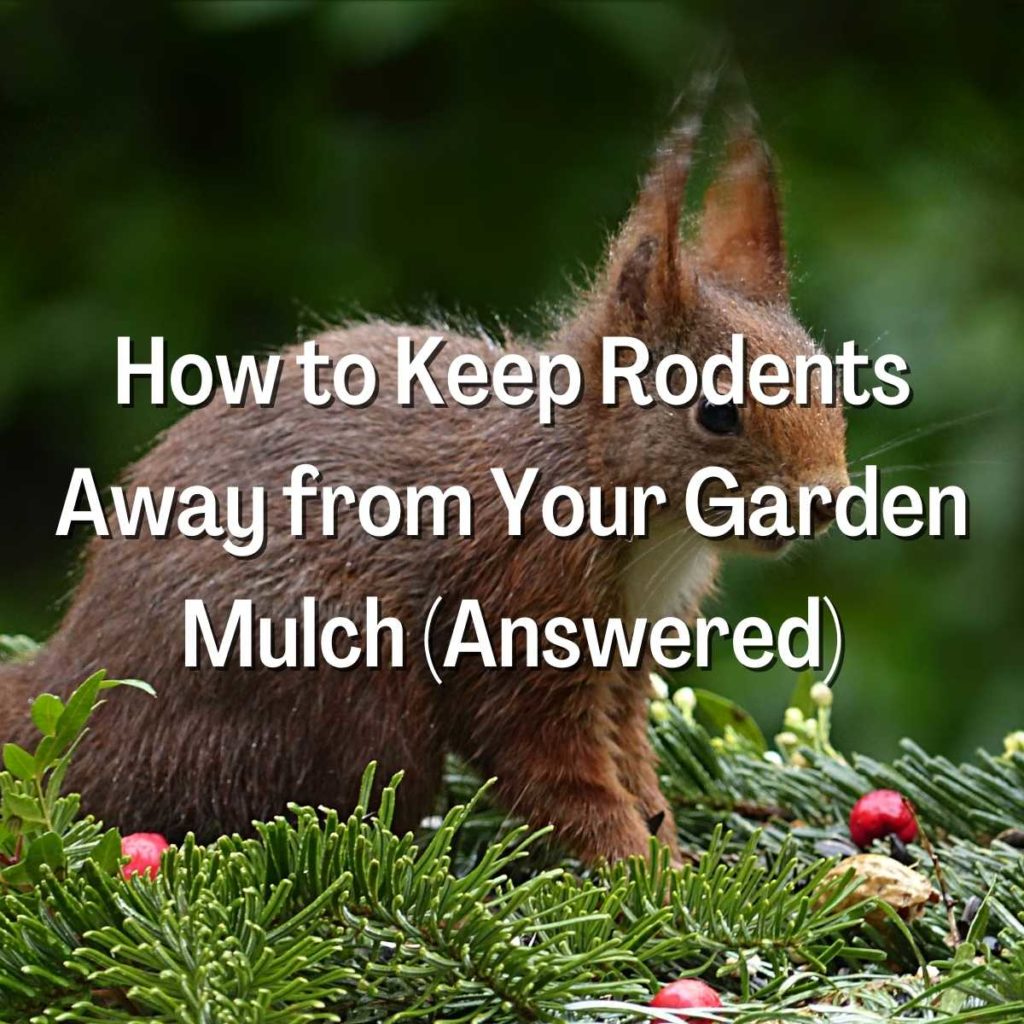
Garden mulch is a popular way to protect plants and soil from harsh weather conditions, but it can also be a haven for rodents looking for a place to nest.
By adding some type of rodent repellent to your garden mulch, you can keep these pests away and protect your plants.
In this article, we’ll discuss why garden mulch can sometimes attract rodents and what kind of mulch keeps rodents away.
What Is Garden Mulch, and Why Is It Used?
Garden mulch is a material, usually organic, that is spread around or over the soil in a garden.
Mulch can be anything from shredded bark and wood chips to straw and leaves. It helps to suppress weeds, keeps the soil moist, and can add nutrients to the soil as it breaks down.
Mulch is also used for aesthetic reasons, as it can make a garden look more polished and tidy.
What Can Happen if You Don’t Use Garden Mulch?
If you don’t use garden mulch, your plants are susceptible to many problems. First, the soil can become too dry, leading to stressed and dying plants.
Weeds can also take over, competing with your plants for water and nutrients. Using garden mulch can help prevent all of these problems.
Mulch can also help keep rodents away from your plants. Rodents are attracted to gardens because of the food and shelter.
Related Post: How to Avoid Putting Down Too Much Peat Moss (Helpful Tips)
So, if you have a rodent problem in your garden, using mulch can help deter them. There are a few things to keep in mind when choosing a mulch to discourage rodents:
- Consider using a mulch made from prickly plants, such as roses or blackberry bushes.
- Use a thick layer of mulch to make it more difficult for rodents to get to your plants.
If you have problems with rodents in your garden, using mulch can help deter them.
Keep these tips in mind when choosing a mulch to keep your garden free of these pests.
How Does Garden Mulch Attract Rodents?
Mulch provides rodents with an appealing food source and a comfortable living place. In addition, rodents are attracted to the smell of mulch, which can contain rotting leaves and other organic matter.
They also like to burrow in mulch because it is soft and easy to dig into. As a result, mulch can attract rodents like mice and rats, posing a serious threat to your garden.
Not only will they eat your plants, but they can also carry disease.
If you suspect rodents are a problem in your garden, you may want to consider using traps or baits to control the rodent population.
What Kind of Mulch Keeps Rodents Away?
You can do a few things to keep rodents away from your garden mulch. First, try using cedar mulch, which has a strong scent that will deter rodents.
To keep rodents away, you can add mothballs or ammonia-soaked rags to your mulch pile.
Finally, keep your mulch pile clean and debris-free, so it does not attract rodents.
Related Post: Can Outdoor Furniture be Left Out in the Rain? (Explained)
What Type of Rodent Repellent Should You Use?
There are a variety of rodent repellents available on the market. You can choose from natural or chemical options.
You may want to avoid using chemicals if you have children or pets. Many effective natural repellents use essential oils or other ingredients to keep rodents away without posing a risk to your family or animals.
Some popular essential oils for keeping rodents away include peppermint oil, eucalyptus oil, and citronella oil. You can find these oils at most health food stores or online.
To make a homemade rat repellent, mix one teaspoon of peppermint oil with 1 cup of water. Pour the mixture into a spray bottle and spritz it around the perimeter of your garden.
You can also try using ultrasonic devices to keep rodents away. These devices emit high-frequency sound waves that are supposed to be unpleasant for rodents. You can find these devices online or in stores that sell pest control products.
How to Apply Rodent Repellent to Your Garden Mulch
- Purchase a rodent repellent from your local hardware, home improvement store, or online. Be sure to choose a product specifically designed to repel rodents, such as deer, rabbits, squirrels, and mice.
- Then, apply the repellent according to the manufacturer’s instructions. This will typically involve spraying the product onto the mulch in your garden beds.
- Reapply the repellent as needed, typically every few weeks or after heavy rains.
- Take other steps to discourage rodents from entering your yard, such as removing potential food sources and sealing up any openings into your home that could serve as an entry point for pests.
Related Post: Can You Place Concrete Pavers on Grass? (Answered)
Additional Tips for Keeping Rodents Away from Your Garden Mulch
- In addition to using a rodent repellent, you can take other steps to keep rodents away from your garden mulch.
- Remove potential food sources from your yard, such as fallen fruit and nuts.
- Seal any openings into your home that could serve as an entry point for pests.
- Keep your mulch pile clean and free of debris.
- Consider using a mulch made from prickly plants, such as roses or blackberry bushes.
- Use a thick layer of mulch to make it more difficult for rodents to get to your plants.
- Mulch with cedar chips or cedar mulch, which has a strong scent that rodents dislike.
- Add mothballs or ammonia-soaked rags to your mulch pile to keep rodents away.
Conclusion
No one wants rodents in their garden, eating away at their plants and leaving droppings everywhere. In this article, we’ve shared a few tips for how to keep rodents away from your garden mulch.
First, try using cedar mulch, which has a strong scent that will deter rodents. You can also add mothballs or ammonia-soaked rags to your mulch pile to keep them at bay.
Keep your mulch pile clean and debris-free to make it less appealing to rats and mice.
Finally, consider using an ultrasonic device to emit high-frequency sound waves that are unpleasant for rodents.
Rodent repellents are available in both natural and chemical varieties; be sure to choose a product specifically designed to repel rodents. Then, apply the repellent according to the manufacturer’s instructions, typically spraying it onto the mulch in your garden beds.
Backyard
How to Keep Birds Out of Garden Mulch (Explained with Examples)

It’s no secret that birds enjoy a good meal of garden mulch. Unfortunately, while this can be helpful for your plants, it can also lead to a mess on your porch or patio.
Fortunately, there are several ways to keep birds from eating your mulch. One way is to use a wire mesh fence to cover the mulch.
You can also use a variety of other deterrents, such as fake owls, reflective tape or twigs.
Why Do Birds Like Garden Mulch so Much?
Birds are attracted to garden mulch for a variety of reasons. The most common reason is that mulch often finds grubs, insects, and other small animals.
These little creatures are a food source for birds, so it’s no surprise that they would be drawn to areas where they can find them.
Another reason birds may be attracted to your mulch is the color. Brightly colored mulches, such as red or orange, are especially attractive to birds.
How Can You Keep Birds from Eating Your Mulch?
There are several ways that you can keep birds from eating your mulch. One of the most effective methods is to use a wire mesh fence.
Related Post: Using Potting Soil to Plant a Tree (Tree Planting Tips)
You can build a simple fence by attaching wire mesh to wooden posts. Be sure to bury the posts in the ground so the birds can’t simply fly over the fence.
Another option is to use a pre-made wire mesh fence. This type of fence is easy to install and can be found at most home improvement stores.
If you don’t want to use a fence, other options are available. For example, you can deter birds by using fake owls, reflective tape, or twigs.
Fake owls are often used to scare birds away from gardens. You can purchase a fake owl at most garden stores or online.
Reflective tape is another option. You can find this tape at most hardware stores. Simply attaching the tape to your fence will help to keep birds away.
Finally, you can use twigs. Place them around the perimeter of your mulch bed. The twigs will deter the birds and stay away from the mulch.
You can use one or more of these methods to keep birds from eating your mulch. You can enjoy your garden without worrying about a mess by taking steps to deter them.
Other Ways to Deter Birds from Your Garden Plants and Flowers
There are other ways to deter birds from your garden plants and flowers. You can use a variety of devices, such as:
- Bird netting
- Bird spikes
- Bird balloons
- Chemical repellents
You can find these devices at most home improvement stores or online. Choose the device that best suits your needs and budget.
Take action to keep birds from eating your mulch. There are a variety of effective methods that you can use. Choose the one that works best for you and enjoy your garden without worry.
Related Post: Can Outdoor Furniture be Left Out in the Rain? (Explained)
Why Is It Important to Keep Birds Away from Your Garden Mulch and Plants?
No one likes a messy garden, and one of the best ways to keep your outdoor spaces tidy is to discourage birds from congregating there.
Birds can be attracted to gardens for many reasons, including the availability of food and water or simply because they enjoy the sheltered space. However, birds can also pose a severe threat to garden plants.
They may overeat mulch, which can lead to debris build-up, or they may spread diseases that can harm or kill delicate plants.
Additionally, if birds are relying on your garden for food, it may indicate that they are not getting the nutrients they need from other sources.
To maintain a healthy environment for your plants and the local bird population, you must do all you can to keep them out of your garden.
What Will Scare Birds Away from Garden?
There are a variety of devices and methods you can use to scare birds away from the garden, including:
- Fake owls
- Reflective tape
- Twigs
- Wire mesh fences
- Chemical repellents
You can find these devices at most home improvement stores or online. Choose the one that best suits your needs and budget.
Take action to keep birds from eating your mulch. There are a variety of effective methods that you can use. Choose the one that works best for you and enjoy your garden without worry.
How Can You Make Your Garden More Bird-Friendly?
If you want to make your garden more bird-friendly, you can do a few things. First, make sure that there is a food source available for them.
Related Post: How to Avoid Putting Down Too Much Peat Moss (Helpful Tips)
This can be in the form of bird feeders or bird houses. You should also provide a water source, such as a birdbath, for them to drink and bathe in.
Second, provide shelter for them. This can be in the form of trees, shrubs, or man-made structures, such as birdhouses.
Finally, avoid using chemicals in your garden. These can be harmful to birds and other wildlife. Choose instead to use natural methods, such as mulch and compost, to fertilize your plants.
Are There Any Benefits to Having Birds in Your Garden?
Birds can actually be beneficial to have in your garden. They can help pollinate plants and spread seeds, which can help increase your plants’ growth.
They can also help to control pests, such as mosquitoes, by eating them. Additionally, their droppings can fertilize your plants.
So, while you may want to keep them out of some regions of your garden, such as the mulch bed, there are some benefits to having them around.
Final Thoughts
If you’re having trouble with birds eating your garden mulch, don’t worry – there are plenty of ways to keep them away.
We’ve outlined a few methods you can try, so choose the one that works best for you and enjoy your garden without bird messes.
Additionally, we’ve listed some benefits to having birds in your garden, so remember when considering how to deal with pesky birds.
-
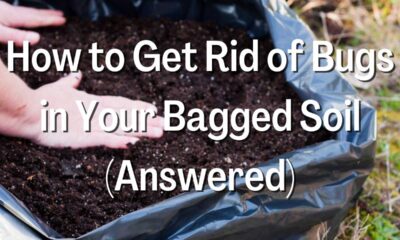
 Gardening9 months ago
Gardening9 months agoHow to Get Rid of Bugs in Your Bagged Soil (Answered)
-
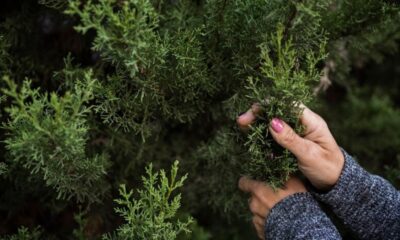
 Backyard9 months ago
Backyard9 months agoShould You Remove Pine Needles from Under a Tree? (Answered)
-

 Gardening9 months ago
Gardening9 months ago10 Surprising Facts About Greenhouses (How Do Greenhouses Work?)
-
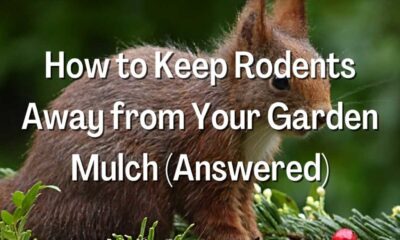
 Backyard9 months ago
Backyard9 months agoHow to Keep Rodents Away from Your Garden Mulch (Answered)
-
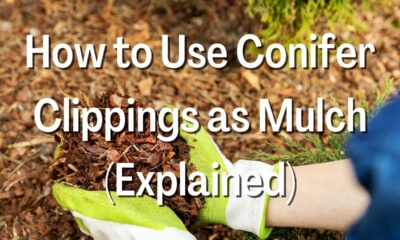
 Backyard9 months ago
Backyard9 months agoHow to Use Conifer Clippings as Mulch (Explained)
-

 Gardening9 months ago
Gardening9 months agoTips for Growing Tomatoes in Clay Soil (Important Facts!)
-
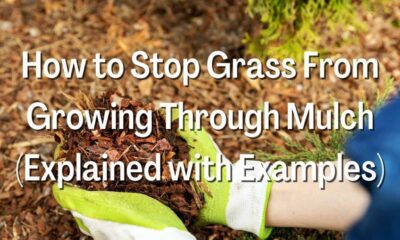
 Gardening9 months ago
Gardening9 months agoHow to Stop Grass From Growing Through Mulch (Explained with Examples)
-

 Gardening9 months ago
Gardening9 months agoWhy Seed Scarification is Important (What Is Seed Scarification)
